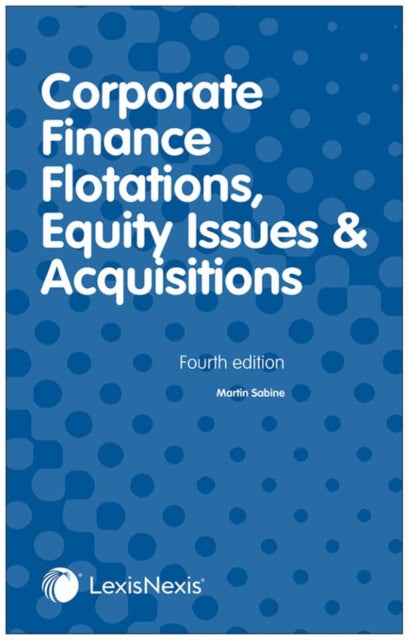
Value Shifts: How Investors are Advancing Sustainability in Capital Markets
 Limited Time Sale
Limited Time Sale$17.01 cheaper than the new price!!
Free cash-on-delivery fees for purchases over $99
Product details
| Management number | 201906266 | Release Date | 2025/10/08 | List Price | $17.02 | Model Number | 201906266 | ||
|---|---|---|---|---|---|---|---|---|---|
| Category | |||||||||
Socially responsible investment (SRI) is becoming mainstream, but there is a risk of complexity and diffusion of effort. Value Shifts: How Investors Are Advancing Sustainability in Capital Markets provides an independent account of investor-led sustainability and responsible investment movements, examining their rise in influence, specific types of activity, and potential role in effecting real system change.
Format: Paperback / softback
Length: 256 pages
Publication date: 06 January 2021
Publisher: Taylor & Francis Ltd
Socially responsible investment (SRI) was once a distinct category of investment theory and practice, adhered to by specialized investment professionals and dedicated funds. However, with the increasing importance of environmental, social, and governance (ESG) factors in fund mandates, asset identification, evaluation, selection, and review, SRI is fast becoming established practice. This has led to a proliferation of campaigns and commitments, which can lead to increased complexity and diffusion of effort and impact. There is a need to consider whether aggregation, coordination, and, in some cases, integration are necessary steps to build influence, strengthen alliances, and translate aspirations into practical, legal, strategic, and sustainable action.
Value Shifts: How Investors Are Advancing Sustainability in Capital Markets anticipates and responds to this need to take stock of the current state of investor engagement on sustainability. It is an independent account, assessment, and profile of investor-led sustainability and responsible investment movements, which serves as a platform to chronicle and explore their recent rise in influence, examine specific types of activity, and consider their current and potential role in effecting real system change.
One of the key findings of Value Shifts is that SRI is becoming more mainstream and diverse. While it was once associated with a small group of investors, it is now attracting a wider range of investors, including institutional investors, family offices, and individual investors. This diversity has led to a greater range of investment strategies and approaches, which can be more effective in addressing sustainability challenges.
Another important finding of Value Shifts is that SRI is becoming more impactful. Investors are increasingly using their investments to drive positive social and environmental outcomes, such as reducing greenhouse gas emissions, improving access to healthcare, and promoting gender equality. This impact is being measured and reported through various metrics, such as the Sustainable Development Goals (SDGs) and the Environmental, Social, and Governance (ESG) rating systems.
However, there are also challenges associated with SRI. One of the biggest challenges is the lack of transparency and accountability in the investment industry. Many investors are not fully aware of the ESG risks and opportunities associated with their investments, and this can lead to poor investment decisions. Additionally, there are concerns about the impact of SRI on financial performance, with some investors arguing that it can lead to lower returns.
To address these challenges, Value Shifts recommends a number of steps. One of the most important steps is to increase transparency and accountability in the investment industry. This can be done by requiring investors to disclose their ESG policies and practices, and by providing investors with access to independent research and analysis.
Another important step is to promote collaboration and coordination among investors. This can be done by creating networks and platforms that allow investors to share information and collaborate on sustainability initiatives. Additionally, investors can work together to develop and implement ESG standards and regulations.
In addition to these steps, Value Shifts also recommends that investors consider the impact of their investments on the broader economy. This can be done by investing in companies that are committed to sustainable practices and that are contributing to the growth of the economy. Additionally, investors can consider investing in sustainable infrastructure, such as renewable energy and transportation.
Finally, Value Shifts recommends that investors consider the impact of their investments on society. This can be done by investing in companies that are committed to social justice and that are providing benefits to their employees and communities. Additionally, investors can consider investing in social impact funds, which are designed to provide financial support to social enterprises and organizations.
In conclusion, socially responsible investment is becoming more mainstream and diverse, and it is becoming more impactful. However, there are also challenges associated with SRI, such as the lack of transparency and accountability in the investment industry, the impact of SRI on financial performance, and the impact of investments on society. To address these challenges, Value Shifts recommends a number of steps, including increasing transparency and accountability, promoting collaboration and coordination among investors, considering the impact of investments on the broader economy, and considering the impact of investments on society. By taking these steps, investors can help to drive positive social and environmental outcomes and to build a more sustainable and equitable future for all.
Dimension: 234 x 156 (mm)
ISBN-13: 9781783533138
Correction of product information
If you notice any omissions or errors in the product information on this page, please use the correction request form below.
Correction Request Form
















